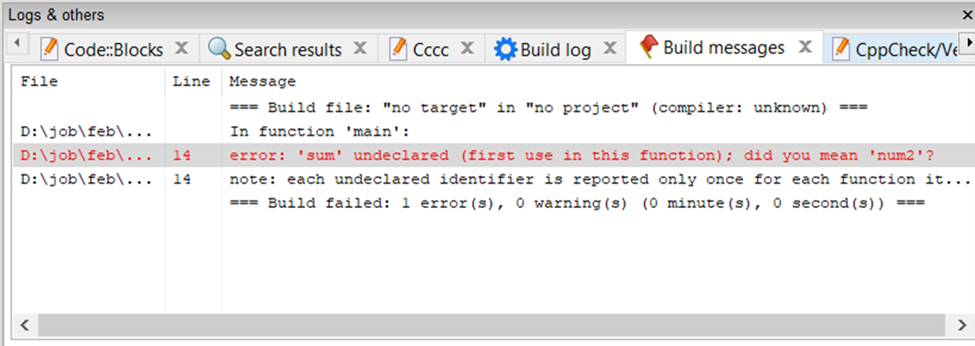When Does a Memory Leak Occur?
After software allocates memory but does not release it after it is through with it, there is a memory leak. This means that the program continues to allocate more and more memory for new variables while leaving old memory allocated and unused. This results in the program using more and more memory, and eventually, the program crashes due to an out-of-memory error.
Effects of Memory Leak in C
Memory leaks can cause a lot of problems in a program. If left unchecked, a memory leak can cause the program to crash or stop running, which can lead to data loss or corruption. Moreover, since the program is consuming more memory than it needs, it can impact system performance and may slow down other programs running on the same system.
Memory Allocation in C Language
Memory allocation is performed using the malloc() function in C Language. This method gives back a reference to a memory block with the specified size. The pointer value is used to access the allocated memory block. Once the memory is not required, it needs to be freed using the free() function.
Causes of Memory Leaks
Some of the causes of the memory leaks are:
1: Improper Memory Management
The most frequent reason for memory leaks is poor memory management on the part of the programmer. This happens when a program neglects to release memory that is no longer required.
#include<stdlib.h>
int main()
{
int *ptr = (int*)malloc(sizeof(int));
*ptr = 10;
printf("%d\n", *ptr);
ptr = NULL;
return 0;
}
In the above code, using the malloc() method in the ptr pointer, we allocated space for an integer memory block. The ptr pointer’s value changes when we set NULL to it, yet the memory block it was previously referring to is not released. Therefore, a memory leak will result.
Output
2: Out of Scope Pointer
When a pointer variable exists its scope, a memory leak occurs in C programs.
#include<stdlib.h>
int main()
{
int num1 = 32, num2 = 23;
{
int *sum = (int*)malloc(sizeof(int));
*sum = num1 + num2;
printf("%d\n", *sum);
}
printf("%d\n", *sum);
return 0;
}
In the C program above, the main() function uses a local scope to allocate an integer memory block to the sum pointer variable. Since we utilized the sum pointer to assign the addition of a and b to the newly formed memory block, the memory block is continuously allocated even after the block scope is over. Therefore, a memory leak will occur.
Output
Detection of Memory Leaks in C
Detection and prevention of memory leaks are critical to maintaining program stability and performance. To detect memory leaks, programmers can use tools like Valgrind, a memory debugging and profiling tool. Valgrind helps identify memory leaks by tracking all memory accesses in a program and identifying when allocated memory is not released.
Preventing Memory Leaks in C
To prevent memory leaks, follow the below-given instructions.
1: Always Release Allocated Memory
Memory should always be explicitly released using the free() method after it has been dynamically allocated using a function like malloc(), calloc(), or realloc(). By doing this, it is made sure that the memory is returned to the system and is available for other uses.
2: Monitoring Allocated Memory
Monitoring allocated memory is important in order to make sure that it is released when it is no longer required. This may be achieved by keeping track of every memory that has been allocated and releasing it when it is no longer needed.
3: Keep Track of Pointers
Pointers should be tracked to automatically manage memory allocation and deallocation, preventing memory leaks.
4: Utilize Static Analysis Tools
At build time, static analysis tools can identify possible memory leaks in C programs, such as Clang and GCC. Before the application is run, these tools can assist in locating possible memory leaks and making correction suggestions.
The following example illustrates the above process.
#include <stdio.h>
#include <stdlib.h>
int main()
{
int *ptr = (int*)malloc(sizeof(int));
if (ptr == NULL) {
printf("Memory allocation error.\n");
return 1;
}
*ptr = 10;
printf("%d\n", *ptr);
free(ptr);
return 0;
}
This above code first determines whether memory allocation was successful by checking to see whether the ptr reference is not NULL. The code may handle the error appropriately if the allocation fails. If the allocation was successful, the code gives the memory block a value of 10 and outputs it. After that, the code releases the memory that was allocated by using the free() function.
Output
Conclusion
Memory leaks can cause significant problems in programs, including performance degradation and crashes. Such issues can be identified and prevented through careful memory management, proper testing, and monitoring memory usage. As such, programmers must be aware of the potential for memory leaks and should take the necessary steps to prevent them.



